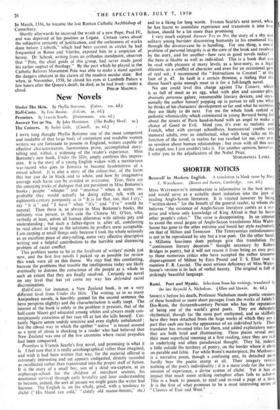SHORTLY before his death, Professor Nicholson made poetic versions of
these hundred or more short passages from the works of Jalalu'l- Din-Rumi, the thirteenth-century Persian who has the reputation of being one of the world's great poets. They are delicately rhythmical, though for the most part unrhymed, and so skilfully have they been detached from the huge works of which they are a part that each one has the appearance of an individual lyric. Their translator has invented titles for them, and added explanatory notes that are both brief and illuminating. These pieces reveal only their most superficial meaning at a first reading, since they are rich in underlying and often paradoxical thought. They lie, indeed, a little outside the territory of poetry, on the border where it abuts on parable and fable. For while Rumi's masterpiece, the Mathnawi, is a narrative poem, though a confusing one, its detached parts hardly bear the poetic stamp at all. Their imagery reveals nothing of the poet's individuality ; it is a mere code for the trans- mission of experience, a divine system of cliché. Yet it has an impact that much more striking metaphor often fails to achieve. This is a book to possess, to read and re-read a page at a time It is the first of what promises to be a most interesting series of " Classics of East and West."






































 Previous page
Previous page